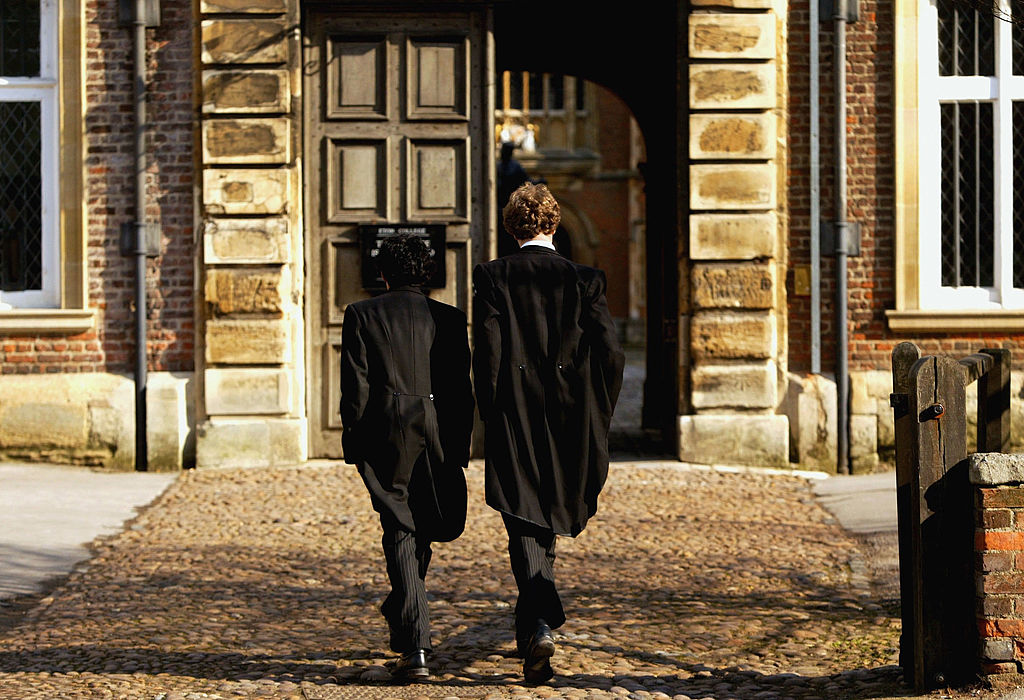Someone once said that the two greatest moments you enjoy when owning a yacht are the day you buy it and the day you sell it. You could make a similar case for school fees: nothing feels quite as good as the day you finally stop paying them.
Much as we are impressed by the hockey pitch, what we’re really choosing for our kids is a peer group
All the same, I feel a bit of an ingrate grumbling about private schools, since both my daughters did very well from them. Both ended up with a superb network of seemingly lifelong friends, had a mostly very happy time at school and attended the universities they wanted to attend, studying the subjects they wanted to study.
Perhaps most importantly – and this might be the dirty little unspoken secret of education – they’re good company, amusing and pleasant to be around, and can mix pretty happily with everyone in a range of social settings. Back in the 1950s, a doctor explained to my grandfather that he was happy to pay to send his son to private school for reasons of deportment alone: ‘It’s worth it just for the way they walk into a room.’ Seventy years later, we may not approve, yet we all know what he means.
Or you could look at this another way, as the Dutch anthropologist Joris Luyendijk has done, and argue that the whole of British life is riddled with unwritten, unspoken, but often exclusionary social codes, even governing such trivial factors as entering a room or closing the door. And whereas you can selectively break these codes, you will never get away with not knowing them in the first place. Moreover, these codes are becoming more discriminatory as they become less explicit, and hence more difficult to learn without exposure to people who already follow them.

Back in the 1980s, a friend of mine applied to a large and venerable financial institution. He was tipped off in advance that to appear for the interview in anything other than black lace-up Oxford shoes would effectively ruin his chances of a job. This was absurd. But at least it was an explicit rule which could be explained to others. The same argument is made for school uniforms: that, although restrictive and arbitrary, they are in fact far less divisive than the alternatives. The requirements for a uniform are written down for all to see and are hence more navigable to outsiders than requiring everyone to navigate complex, arcane and ever-shifting nuances about currently acceptable brands of trainers. With the removal of many of these arbitrary yet explicit rules, we are left with only tacit rules, which are harder for outsiders to hack. (By the way, I suspect that a mastery of these codes is just as important to securing a job at the Guardian as it is for getting a job at the Times.)
Put bluntly, a private education is a fairly reliable way for your children to acquire the necessary codes and social skills which are a lifelong source of advancement (after the age of 28, no one cares what class of university degree you attained). And, though no one admits this, when we are choosing a school for our kids, much as we claim to be impressed by the heated hockey pitch or the large music hall, what we are really choosing for our children is a peer group. We hope that our children can be taught to be successful, but even if this fails, we instinctively understand that a large part of success is contagious, through the instinctive adoption of the codes of already successful people.
That is why schools and universities are such powerful luxury goods brands. Like Louis Vuitton bags, we don’t buy them for what we think of them, but for what we imagine everyone else thinks of them. Since it is very hard to shift collective opinion, there really is very little meaningful competition.
This is what I mean by a dirty little secret – it is something that we never say, but all instinctively know. Quite simply the UK is overwhelmingly a service economy. We pretend through the exam system that we are selecting children for technical or administrative jobs, because it seems more meritocratic that way, and it maintains the pretence of fairness for all, but we know deep down that mastery of the unspoken codes of behaviour is what really matters in an economy where the technical questions can be left to a small cadre of underlings, while the really important work is interpersonal. As the American economist Deirdre McCloskey points out, ‘Sweet talk accounts for 25 per cent of national income in the US’; in the UK, it is probably higher still.
Yet the state system mostly refuses to teach these codes. Much as they want social mobility, they insist that this must be obtained through exam results and confected intellectual meritocracy, not through other forms of life preparation. To teach pupils how to walk into a room would be considered almost as heinous as giving elocution lessons to northerners to encourage them to speak RP. So if you want your children to acquire the habits necessary for remunerative employment from the state education system, you have to fall back on selecting a peer group by means of moving to a particular catchment area. This is even less efficient and less fair than paying school fees: at least when paying fees the money does end up funding teaching, rather than giving a windfall to some estate agent in the CSCA (an acronym pervasive on Kent property advertisements which stands for Cranbrook School Catchment Area). This was one of the reasons I ended up educating my children privately – I was damned if I was going to spend £100,000 moving house just to satisfy some local authority postcode algorithm.
But here’s the problem. Before they got greedy, and fatuously obsessed with vanity building projects and courting Chinese and oligarch money, the private schools did at least impart those codes to the children of the mildly prosperous, not only the rich. Back in the 1980s, the then Headmasters’ Conference listed occupations which could be expected to pay enough for private education: there were about 20 of them, including GPs, country solicitors, army officers etc. The latest list is down to about five: banking, insurance, real estate, entrepreneurs and more banking. My daughter’s school once sent out a plaintive letter asking for parents in the civil service to give a talk to the children about career prospects: ‘We have plenty of offers from parents in banking but none from the public sector.’ Well, at £35,000 per annum for a day pupil, I’m not altogether surprised. And that’s before you factor in the school trips: at my school, it was a day trip to Penscynor Wildlife Park; now it’s ten days of scuba diving in bloody Mexico.

So what’s to be done? I would argue that discussion of social mobility is meaningless until we bring in some anthropologists to investigate the role these codes play in the workplace. I suspect a multivariate analysis of such codes would reveal that they easily trump race and gender in determining success. We also have to discuss how this finding might apply to universities.
Seen through this anthropological lens, I worry that the Oxbridge bias against privately educated pupils may be a catastrophe for the two ancient universities. The rich poshos know how to game the system and will simply choose to congregate somewhere else. What if it was the exposure to rich posh people that was a large part of the value of an Oxbridge education, and essential to social mobility? I have to admit this was partly true for me. Besides, the 20 per cent of rich poshos provided about 80 per cent of the fun.
Let me finish with a salutary tale from my own university days. Ordinary friend: ‘There’s a lecture this evening on the Delian Confederacy at the Sidgwick site.’ Posh friend: ‘There’s a pub in Toft that does draught Theakston’s and a handmade steak and kidney pudding.’ Twenty minutes later, I was sitting in a Golf GTi heading for Toft. I’m kind of shallow like that.






Comments